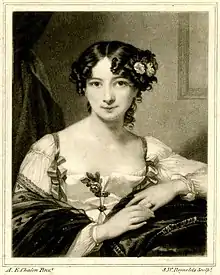Sarah Elizabeth Utterson
Sarah Elizabeth Utterson née Brown (3 November 1781 – 22 September 1851) was a British translator and author. She anonymously translated most of Fantasmagoriana (1812) as Tales of the Dead (1813), which also included her own short story "The Storm".[1][2][3]
Sarah Elizabeth Utterson | |
|---|---|
 Mezzotint by Samuel William Reynolds after a portrait by Alfred Edward Chalon painted around 1803–1807 | |
| Born | Sarah Elizabeth Brown November 3, 1781 St Mary-at-Hill, Middlesex, England |
| Died | September 22, 1851 (aged 69) Brighton, Sussex, England |
| Years active | 1813 |
| Notable works | Tales of the Dead |
| Spouse | Edward Vernon Utterson (m. 1803) |
| Parents | Timothy Brown |
| Relatives | Timothy Yeats Brown (brother) |
| Signature | |
Life
Born Sarah Elizabeth Brown on 3 November 1781 in St Mary-at-Hill, Middlesex, London to Sarah and Timothy Brown. She married Edward Vernon Utterson on 2 May 1803.[1][4] Writing in 1938, A. T. Utterson described her as "charming" and "mouse-like", and commented that "the marriage was completely successful".[5] Though the Oxford Dictionary of National Biography states she and her husband had several children together,[4] Abraham Marrache writes that the couple "had no descent",[6] while A. T. Utterson says that they had "a rather mysterious daughter, believed to have been adopted, but about whom nothing is certainly known".[5][note 1] They lived at 1 Elm Court, Temple, and 19 Great Ormond Street around 1805 and 1806, and moved to 32 Great Coram Street, Brunswick Square, London by 1808.[4][8][9][10]
In 1813, Utterson translated five of the eight stories in the French collection of German ghost stories Fantasmagoriana (1812) as Tales of the Dead, adding her own short story "The Storm" to the book.[11][12] The book was published anonymously, but by 1820 Utterson was known to be the translator.[13] Her introduction to Tales of the Dead mentions "a female friend of very deserved literary celebrity",[14] and she wrote letters to her friend the author Jane Porter[15] and perhaps her sister Anna Maria Porter as well.[16][17]
She and her husband lived at 11 South Audley Street from 1820–25, and then 32 York Terrace, Regent's Park by 1829. Around 1835 they moved to the Isle of Wight, living first at Newport, and then moving to Ryde, where they lived at Buckland Grange (which before their time was a farm called Ryde House), before building Beldornie Tower, Pelham Field in 1840.[18][4][8][9] At the time of the 1841 Census, they had five servants living there.[19]
When Edward Dawes was elected Member of Parliament for the Isle of Wight in May 1851 on the principles of free trade, it was said that her husband "took such umbrage that he removed from Ryde", though they had been registered as living at 16 Suffolk Street, St Martins in the Fields, London, during the 1851 Census, held two months before.[20]
Notes
- A. T. Utterson continues "... about whom nothing is certainly known except that she once sent her compliments to Mrs. Bliss",[5] in reference to Edward Vernon Utterson's letter to Philip Bliss dated 26 August 1814, which ends by saying "Mrs. U[tterson] unites in comp[limen]ts with My daughter".[7]
References
- "Utterson, Sarah Elizabeth, 1781–1851". Library of Congress.
- "Sarah Utterson (1780–1830)". NEWW Women Writers.
- "Utterson, Sarah Elizabeth". The Women's Print History Project.
- Sherbo, Arthur (2018) [2004]. "Utterson, Edward Vernon". Oxford Dictionary of National Biography (online ed.). Oxford University Press. doi:10.1093/ref:odnb/28039. (Subscription or UK public library membership required.)
- Utterson, A. T., ed. (1938). "Memoir". Letters of a Literary Antiquary. p. 10. OCLC 54262906.
- Marrache, Abraham S. (2017). Timothy 'Equality' Brown: A Radical Regency Life. Pomegranate Press. ISBN 9781907242649.
- Utterson, A. T., ed. (1938). "Letter VI". Letters of a Literary Antiquary. p. 22. OCLC 54262906.
- Triphook, Robert, ed. (1816). Miscellanea Antiqua Anglicana; Or, A Select Collection of Curious Tracts Illustrative of the History, Literature, Manners, and biography, of the English Nation. London: T. Bensley and Son. p. 295. OL 7055623M.
- Transactions of the Society, Instituted at London, for the Encouragement of Arts, Manufactures, and Commerce. Vol. 23. Royal Society for the Encouragement of Arts, Manufactures and Commerce. 1805. p. 493. ISSN 2049-7873.
- "The Anniversary of the Birth-Day of Mr. Pitt". The Morning Chronicle. No. 12162. London. 7 May 1808. p. 1.
- van Woudenberg, Maximiliaan (2014). "The Variants and Transformations of Fantasmagoriana: Tracing a Travelling Text to the Byron-Shelley Circle". Romanticism. 20 (3): 306–320. doi:10.3366/rom.2014.0194.
- Camilletti, Fabio (November 2018). "From Villa Diodati to Villa Gabrielli: A Manuscript Appendix to Fantasmagoriana". Gothic Studies. Manchester University Press. 20 (1–2): 214–226. doi:10.7227/GS.0045. S2CID 192041279.
- Triphook, Robert (1820). Catalogue of the Library at Eshton-Hall in the County of York. London: B. McMillan. p. 115.
- Utterson, Sarah Elizabeth, ed. (1813). "Advertisement". Tales of the Dead. p. ii.
- Sarah Elizabeth Utterson (1832). "Sarah Elizabeth Utterson to Jane Porter, autograph letter signed". NYPL Digital Collections. New York Public Library. Retrieved 1 November 2022.
- Utterson, A. T., ed. (1938). "Letter IV". Letters of a Literary Antiquary. pp. 19–20, 42. OCLC 54262906.
- Sarah Elizabeth Utterson (1816). "Sarah Elizabeth Utterson to Miss Porter, autograph letter signed". NYPL Digital Collections. New York Public Library. Retrieved 1 November 2022.
- Sheppard, F H W, ed. (1980). "South Audley Street: East Side". Survey of London: the Grosvenor Estate in Mayfair, Part 2 (The Buildings). Vol. 40. London: British History Online. pp. 291–303. Retrieved 13 April 2022.
- "Upstairs Downstairs" (PDF). Beyond the Graves. Vol. 13, no. 2. Ryde Social Heritage Group. April 2018. p. 4.
- Brigstocke, G. R. (18 August 1906). "Beldornie Press". Notes and Queries. 10. London: John C. Francis and J. Edward Francis. 6 (138): 132. doi:10.1093/nq/s10-VI.138.132c. Retrieved 4 August 2012.